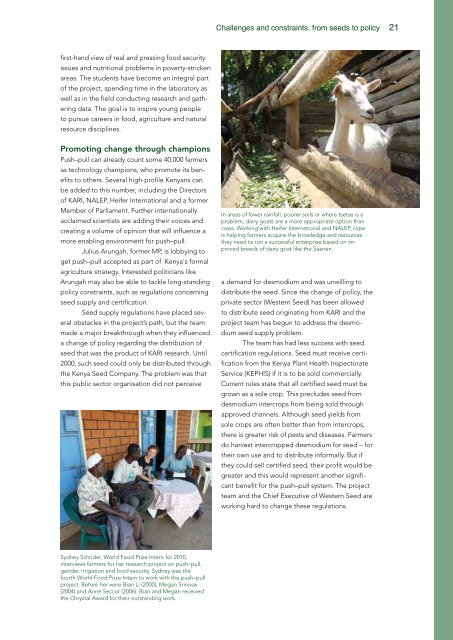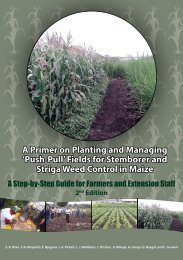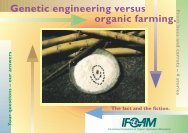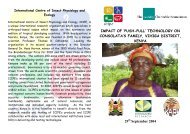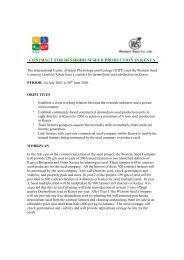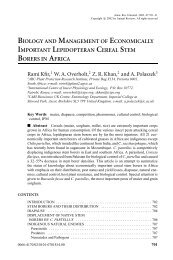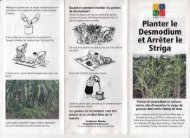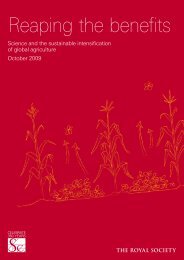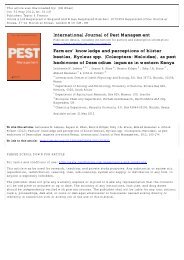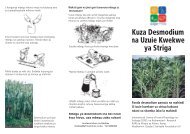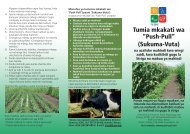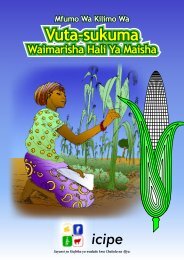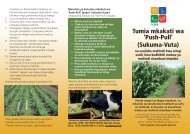a model for Africa's green revolution - Push-Pull
a model for Africa's green revolution - Push-Pull
a model for Africa's green revolution - Push-Pull
Create successful ePaper yourself
Turn your PDF publications into a flip-book with our unique Google optimized e-Paper software.
Challenges and constraints: from seeds to policy 21<br />
first-hand view of real and pressing food security<br />
issues and nutritional problems in poverty-stricken<br />
areas. The students have become an integral part<br />
of the project, spending time in the laboratory as<br />
well as in the field conducting research and gathering<br />
data. The goal is to inspire young people<br />
to pursue careers in food, agriculture and natural<br />
resource disciplines.<br />
Promoting change through champions<br />
<strong>Push</strong>–pull can already count some 40,000 farmers<br />
as technology champions, who promote its benefits<br />
to others. Several high-profile Kenyans can<br />
be added to this number, including the Directors<br />
of KARI, NALEP, Heifer International and a <strong>for</strong>mer<br />
Member of Parliament. Further internationally<br />
acclaimed scientists are adding their voices and<br />
creating a volume of opinion that will influence a<br />
more enabling environment <strong>for</strong> push–pull.<br />
Julius Arungah, <strong>for</strong>mer MP, is lobbying to<br />
get push–pull accepted as part of Kenya's <strong>for</strong>mal<br />
agriculture strategy. Interested politicians like<br />
Arungah may also be able to tackle long-standing<br />
policy constraints, such as regulations concerning<br />
seed supply and certification.<br />
Seed supply regulations have placed several<br />
obstacles in the project’s path, but the team<br />
made a major breakthrough when they influenced<br />
a change of policy regarding the distribution of<br />
seed that was the product of KARI research. Until<br />
2000, such seed could only be distributed through<br />
the Kenya Seed Company. The problem was that<br />
this public sector organisation did not perceive<br />
In areas of lower rainfall, poorer soils or where tsetse is a<br />
problem, dairy goats are a more appropriate option than<br />
cows. Working with Heifer International and NALEP, icipe<br />
is helping farmers acquire the knowledge and resources<br />
they need to run a successful enterprise based on improved<br />
breeds of dairy goat like the Saanen.<br />
a demand <strong>for</strong> desmodium and was unwilling to<br />
distribute the seed. Since the change of policy, the<br />
private sector (Western Seed) has been allowed<br />
to distribute seed originating from KARI and the<br />
project team has begun to address the desmodium<br />
seed supply problem.<br />
The team has had less success with seed<br />
certification regulations. Seed must receive certification<br />
from the Kenya Plant Health Inspectorate<br />
Service (KEPHIS) if it is to be sold commercially.<br />
Current rules state that all certified seed must be<br />
grown as a sole crop. This precludes seed from<br />
desmodium intercrops from being sold through<br />
approved channels. Although seed yields from<br />
sole crops are often better than from intercrops,<br />
there is greater risk of pests and diseases. Farmers<br />
do harvest intercropped desmodium <strong>for</strong> seed – <strong>for</strong><br />
their own use and to distribute in<strong>for</strong>mally. But if<br />
they could sell certified seed, their profit would be<br />
greater and this would represent another significant<br />
benefit <strong>for</strong> the push–pull system. The project<br />
team and the Chief Executive of Western Seed are<br />
working hard to change these regulations.<br />
Sydney Schrider, World Food Prize Intern <strong>for</strong> 2010,<br />
interviews farmers <strong>for</strong> her research project on push–pull,<br />
gender, irrigation and food security. Sydney was the<br />
fourth World Food Prize Intern to work with the push–pull<br />
project. Be<strong>for</strong>e her were Bian Li (2000), Megan Srinivas<br />
(2004) and Anne Seccor (2006). Bian and Megan received<br />
the Chrystal Award <strong>for</strong> their outstanding work.


